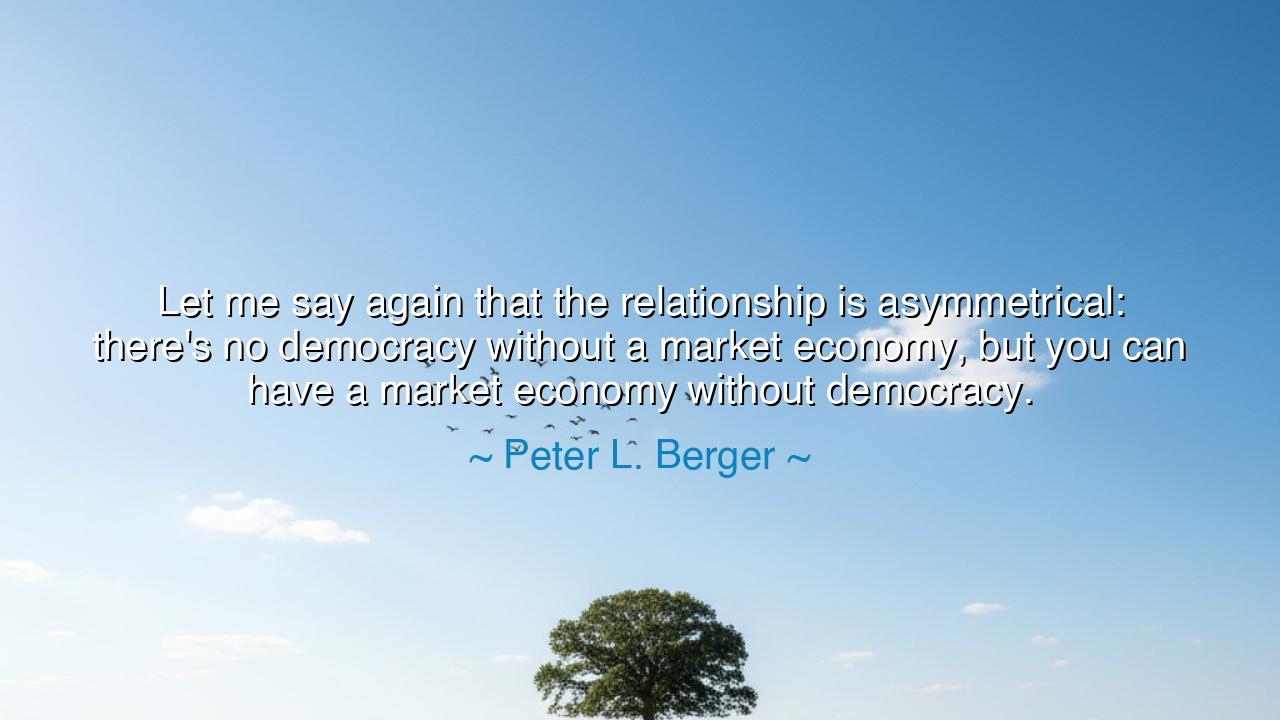
Let me say again that the relationship is asymmetrical: there's
Let me say again that the relationship is asymmetrical: there's no democracy without a market economy, but you can have a market economy without democracy.






The words of Peter L. Berger, “Let me say again that the relationship is asymmetrical: there’s no democracy without a market economy, but you can have a market economy without democracy,” carry the gravity of political wisdom forged by observing the rise and fall of nations. He unmasks a hard truth: that freedom and prosperity are not bound together equally, and while wealth may flourish under many systems, true democracy demands the ground of economic freedom to stand upon.
The asymmetrical relationship he names is the imbalance between politics and markets. A market economy can exist beneath the hand of kings, oligarchs, or even tyrants, for trade and profit heed not the voice of liberty. But democracy, the rule of the people, cannot survive without markets that allow choice, independence, and the circulation of power beyond the state. Thus, the market is the soil; democracy is the flower. Without the soil, the flower withers.
In this, Berger echoes the ancients who knew that the balance of wealth and governance shapes the destiny of empires. Where commerce is stifled, liberty falters; where power rests in a single hand, the people’s voice is silenced. Yet where markets breathe freely, the possibility of democracy may take root, though not guaranteed. The one depends upon the other; the other does not.
Thus, his words warn future generations to discern carefully. Do not mistake prosperity for freedom, for a thriving market economy may mask oppression. But know also that without economic strength and choice, democracy cannot endure. Let this teaching stand: liberty is fragile, and its relationship to wealth is uneven. Only by guarding both can a people hope to remain truly free.






TLNgo Thuy Linh
This idea of asymmetry between democracy and market economy, as stated by Peter L. Berger, really challenges how we view the connection between economic systems and political freedoms. Could we have a successful market economy without democratic freedoms, or does the success of one inevitably require the other? What examples can we look to where market economies have thrived without democracy, and what does that say about the broader relationship between the two?
TVNguyen Truc Vy
Berger’s quote makes me reflect on the complex relationship between capitalism and democracy. Can we really have a truly democratic society without an economy that is market-driven, or is there another path? Is it possible for a society to thrive economically under a controlled economy without losing its democratic ideals? How do we navigate the potential conflicts between economic freedom and political equality?
LRLam Rubin
Peter L. Berger’s statement raises an important point about the tension between market economy and democracy. It seems like market economies, while essential for democracy, can also exist in undemocratic societies. Does this create a paradox where economic prosperity doesn’t necessarily translate into political freedom? How do we ensure that economic growth leads to democratic participation, and not just to greater inequality or authoritarianism?
KH6.Nguyen Khac Hieu
I find Berger’s view on the relationship between democracy and market economy quite intriguing. The idea that a market economy can exist without democracy makes me wonder—does economic freedom always lead to political freedom? In many cases, market economies thrive under authoritarian regimes. Does this mean that democracy is more than just a market economy, or are there other critical components that sustain it?
DMNguyen Duc Minh
Peter L. Berger’s statement about the asymmetry between democracy and market economy is thought-provoking. It seems to suggest that while a market economy can exist independently, democracy cannot function without one. But does that mean that the presence of a market economy guarantees a free society, or are there other factors at play? Can we really have an equitable society when economic power is concentrated in the hands of a few?